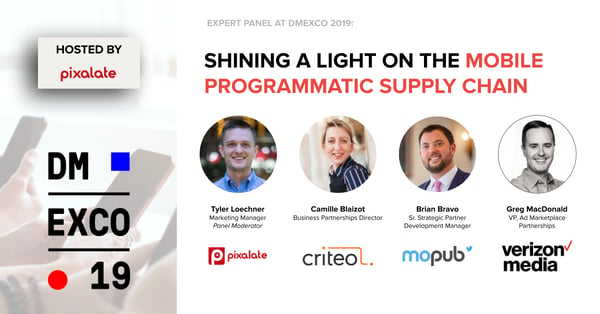
This week's review of ad fraud and quality in the digital advertising space.
Pixalate continues its video interview series with industry leaders, including:

At DMEXCO 2019, Pixalate hosted a panel titled: "Shining a Light on the Mobile Programmatic Supply Chain: The Trust Deficit in Mobile Programmatic" with experts from Criteo, MoPub, and Verizon Media.
Our blog post recaps highlights from the panel and includes a full video recording of the event.

"A malicious website posing as checkrain[.]com was launched by hackers this week, which poses as the real site that researchers are building to modify and jailbreak iPhones," reported Information Security Buzz. "The fake site instead launches a hacking tool that tries to take over affected devices.

"A popular video downloader app for Android has been found generating fake ad clicks and unauthorized premium purchases from its users, according to a security firm," reported TechCrunch. According to TechCrunch, the app "is not on Google Play because the app maker claims Google will not allow video downloader apps on the store," but tens of millions of people are said to use the app.

"Consent-string" fraud is cropping up as GDPR audits take place, reports Digiday. "Dummy strings are being created in some instances," the article reads. "Currently, it is easy to manipulate a consent string, and some vendors are doing so in order to appear as though they have user consent more than they do, so they’re not blocked from buying and selling inventory."
*By entering your email address and clicking Subscribe, you are agreeing to our Terms of Use and Privacy Policy.
These Stories on Weekly Recaps
*By entering your email address and clicking Subscribe, you are agreeing to our Terms of Use and Privacy Policy.

Disclaimer: The content of this page reflects Pixalate’s opinions with respect to the factors that Pixalate believes can be useful to the digital media industry. Any proprietary data shared is grounded in Pixalate’s proprietary technology and analytics, which Pixalate is continuously evaluating and updating. Any references to outside sources should not be construed as endorsements. Pixalate’s opinions are just that - opinion, not facts or guarantees.
Per the MRC, “'Fraud' is not intended to represent fraud as defined in various laws, statutes and ordinances or as conventionally used in U.S. Court or other legal proceedings, but rather a custom definition strictly for advertising measurement purposes. Also per the MRC, “‘Invalid Traffic’ is defined generally as traffic that does not meet certain ad serving quality or completeness criteria, or otherwise does not represent legitimate ad traffic that should be included in measurement counts. Among the reasons why ad traffic may be deemed invalid is it is a result of non-human traffic (spiders, bots, etc.), or activity designed to produce fraudulent traffic.”

